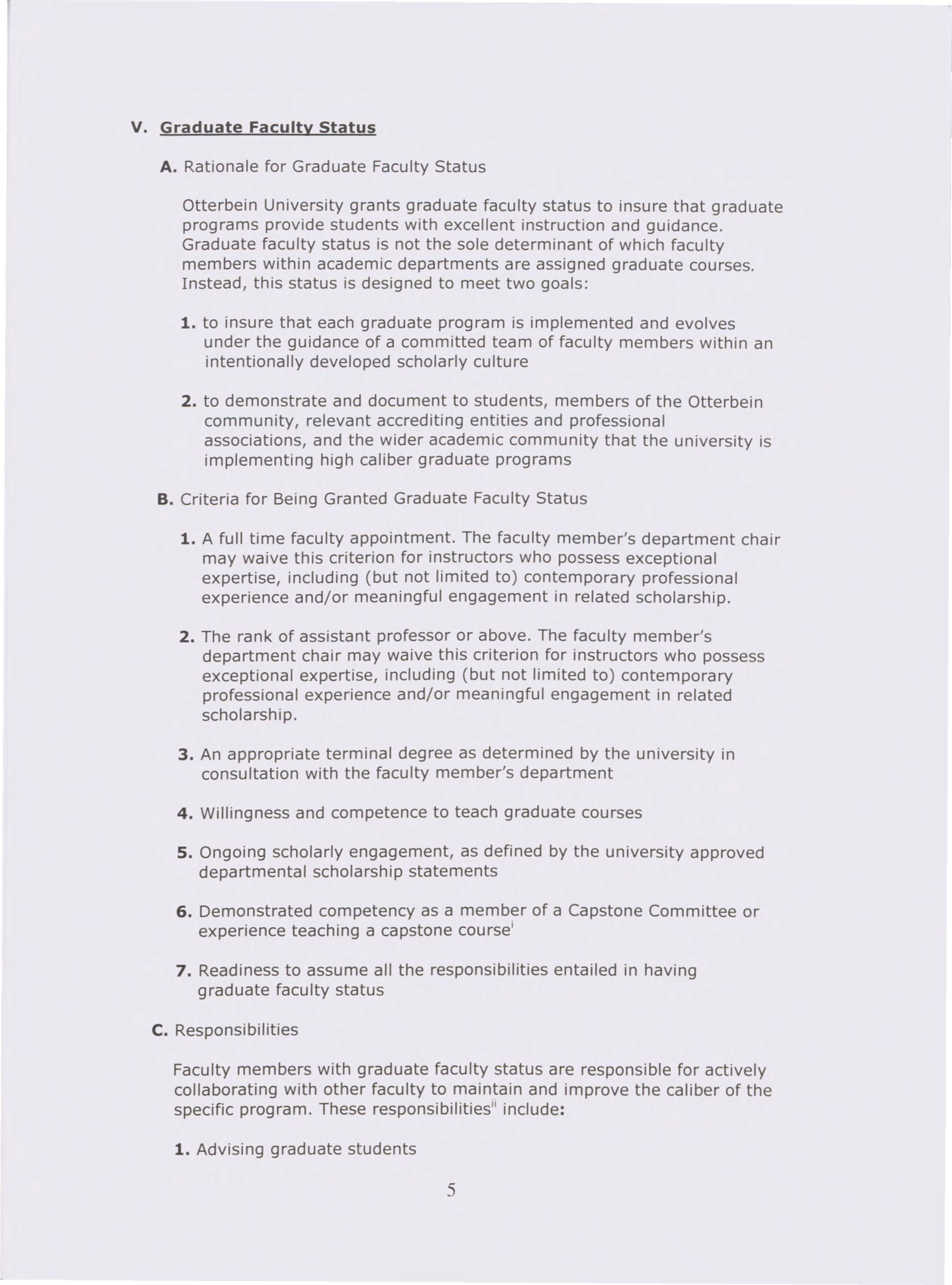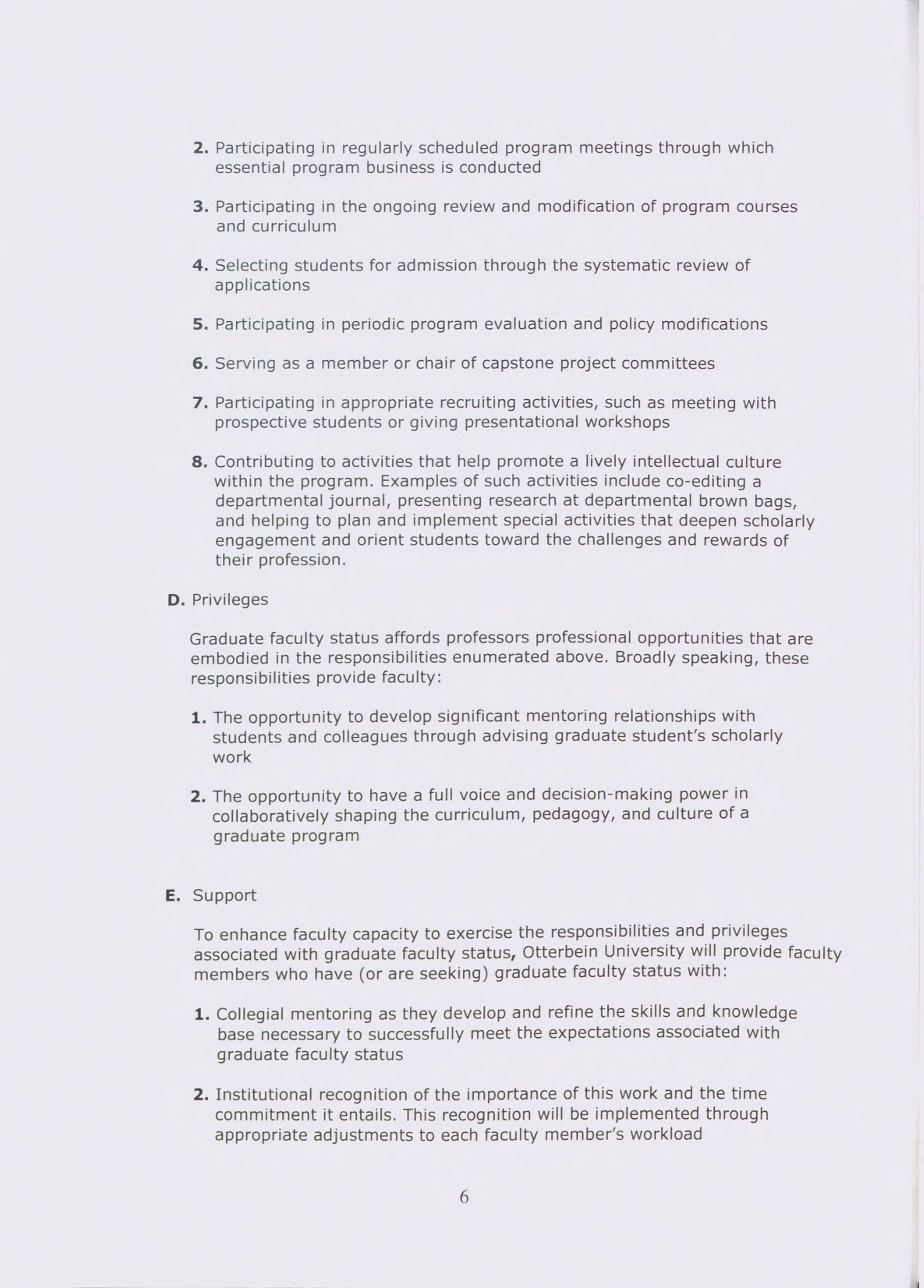
3 minute read
V. GRADUATE FACULTY STATUS
V. Graduate Faculty Status
A. Rationale for Graduate Faculty Status
Otterbein University grants graduate faculty status to insure that graduate programs provide students with excellent instruction and guidance. Graduate faculty status is not the sole determinant of which faculty members within academic departments are assigned graduate courses. Instead, this status is designed to meet two goals:
1. to insure that each graduate program is implemented and evolves under the guidance of a committed team of faculty members within an intentionally developed scholarly culture
2. to demonstrate and document to students, members of the Otterbein community, relevant accrediting entities and professional associations, and the wider academic community that the university is implementing high caliber graduate programs
B. Criteria for Being Granted Graduate Faculty Status
1. A full time faculty appointment. The faculty member's department chair may waive this criterion for instructors who possess exceptional expertise, including (but not limited to) contemporary professional experience and/or meaningful engagement in related scholarship.
2. The rank of assistant professor or above. The faculty member's department chair may waive this criterion for instructors who possess exceptional expertise, including (but not limited to) contemporary professional experience and/or meaningful engagement in related scholarship.
3. An appropriate terminal degree as determined by the university in consultation with the faculty member's department
4. Willingness and competence to teach graduate courses
5. Ongoing scholarly engagement, as defined by the university approved departmental scholarship statements
6. Demonstrated competency as a member of a Capstone Committee or experience teaching a capstone coursei
7. Readiness to assume all the responsibilities entailed in having graduate faculty status
C. Responsibilities
Faculty members with graduate faculty status are responsible for actively collaborating with other faculty to maintain and improve the caliber of the specific program. These responsibilitiesi' include:
1. Advising graduate students
2. Participating in regularly scheduled program meetings through which essential program business is conducted
3. Participating in the ongoing review and modification of program courses and curriculum
4. Selecting students for admission through the systematic review of applications
5. Participating in periodic program evaluation and policy modifications
6. Serving as a member or chair of capstone project committees
7. Participating in appropriate recruiting activities, such as meeting with prospective students or giving presentational workshops
8. Contributing to activities that help promote a lively intellectual culture within the program. Examples of such activities include co-editing a departmental journal, presenting research at departmental brown bags, and helping to plan and implement special activities that deepen scholarly engagement and orient students toward the challenges and rewards of their profession.
D. Privileges
Graduate faculty status affords professors professional opportunities that are embodied in the responsibilities enumerated above. Broadly speaking, these responsibilities provide faculty:

1. The opportunity to develop significant mentoring relationships with students and colleagues through advising graduate student's scholarly
work
2. The opportunity to have a full voice and decision-making power in collaboratively shaping the curriculum, pedagogy, and culture of a graduate program
E. Support
To enhance faculty capacity to exercise the responsibilities and privileges associated with graduate faculty status, Otterbein University will provide faculty members who have (or are seeking) graduate faculty status with:
1. Collegial mentoring as they develop and refine the skills and knowledge base necessary to successfully meet the expectations associated with graduate faculty status
2. Institutional recognition of the importance of this work and the time commitment it entails. This recognition will be implemented through appropriate adjustments to each faculty member's workload
3. Eligibility to apply for Graduate School professional development and research funds that will enhance the knowledgebase and skills they need to effectively advise graduate students
F. Procedures for Gaining and Maintaining Graduate Faculty Status
Departmental chairs are responsible for recommending graduate faculty status to the graduate dean, based on consultative discussions with interested faculty members that take into account their performance, professional goals, and the needs of the department. Based on prior experience, an individual faculty member can be granted graduate faculty status at the time he/she joins the Otterbein University faculty.
At the beginning of every academic year, each departmental chair will circulate a memo to his/her department listing those faculty members who have graduate faculty status, and send a copy of that memo to the Dean of the School of Professional Studies.
; Capstone projects vary from department to department. They include theses, scholarly inquiry projects, clinical projects, and articles.
; ; Faculty who are teaching graduate courses but do not have graduate faculty status may be expected by their departments to perform some of the responsibilities delineated on the list in the Responsibilities section.




